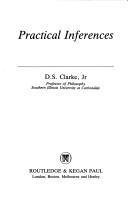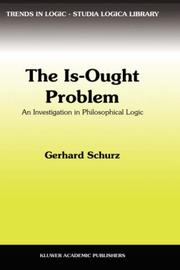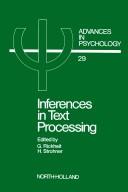| Listing 1 - 10 of 26 | << page >> |
Sort by
|
Book
ISBN: 3700103158 Year: 1979 Volume: 12, 15 287, 358 Publisher: Wien Österreichische Akademie der Wissenschaften
Abstract | Keywords | Export | Availability | Bookmark
 Loading...
Loading...Choose an application
- Reference Manager
- EndNote
- RefWorks (Direct export to RefWorks)
Buddhist logic. --- Inference. --- Logique bouddhique --- Inférence (Logique)

ISBN: 0710204159 Year: 1985 Publisher: London Routledge
Abstract | Keywords | Export | Availability | Bookmark
 Loading...
Loading...Choose an application
- Reference Manager
- EndNote
- RefWorks (Direct export to RefWorks)
Inference --- Inférence (Logique) --- Ampliative induction --- Induction, Ampliative --- Inference (Logic) --- Reasoning --- Inference. --- Inférence (Logique)
Book
ISBN: 9027701555 940103298X 9401032963 9789027701558 Year: 1970 Publisher: Dordrecht Boston, MA : D. Reidel,
Abstract | Keywords | Export | Availability | Bookmark
 Loading...
Loading...Choose an application
- Reference Manager
- EndNote
- RefWorks (Direct export to RefWorks)
Inference --- Information theory --- Inférence (Logique) --- Théorie de l'information --- Influence (logic) --- Inférence (Logique) --- Théorie de l'information
Book
ISBN: 0631161848 9780631161844 Year: 1989 Publisher: Oxford ; London ; Edinburgh... [et al.] : Basil Blackwell,
Abstract | Keywords | Export | Availability | Bookmark
 Loading...
Loading...Choose an application
- Reference Manager
- EndNote
- RefWorks (Direct export to RefWorks)
Inference (Logic) --- Relevance logic --- Relevant logic --- Relevance logic. --- Inference. --- Inference --- Inférence (Logique) --- Ampliative induction --- Induction, Ampliative --- Logic --- Reasoning
Book
ISBN: 2800411317 272985553X 9782729855536 9782800411316 Year: 1996 Volume: *2 Publisher: Paris: Éd. de l'Université Libre de Bruxelles,
Abstract | Keywords | Export | Availability | Bookmark
 Loading...
Loading...Choose an application
- Reference Manager
- EndNote
- RefWorks (Direct export to RefWorks)
Propose une approche historique des statistiques de rangs, des tests de rang avec des définitions et des exemples; des tests de biais, de permutation, des tests invariants; les éléments de la théorie asymptotique des expériences statistiques, des statistiques de rang linéaire : normalité asymptotique et théorème de projection de Hàjek
Mathématiques appliquées
---
Statistieken
---
Statistiques
---
Toegepaste wiskunde
---
Inference
---
Inférence (Logique)
---
#BIBC:ruil

ISBN: 9027713081 902771309X 9400977182 9789027713094 Year: 1982 Volume: 3 Publisher: Dordrecht Reidel
Abstract | Keywords | Export | Availability | Bookmark
 Loading...
Loading...Choose an application
- Reference Manager
- EndNote
- RefWorks (Direct export to RefWorks)
Logic. --- Inference. --- Probabilities. --- Logique --- Inférence (Logique) --- Probabilités --- Kyburg, Henry Ely, --- Levi, Isaac, --- Inférence (Logique) --- Probabilités --- Kyburg, Henry E. --- Kyburg, Henry Ely, - 1928 --- -Levi, Isaac, - 1930 --- -Logic. --- -Kyburg, Henry Ely,
Multi
ISBN: 9780521747486 9780521766777 0521747481 052176677X 9781139028370 9781139336499 1139336495 9781139338233 1139338234 1139028375 1280393491 9781280393495 1139341391 9781139341394 1139334751 9781139334754 9786613571410 6613571415 1139339818 9781139339810 113933400X 113933736X Year: 2012 Publisher: Cambridge Cambridge University Press
Abstract | Keywords | Export | Availability | Bookmark
 Loading...
Loading...Choose an application
- Reference Manager
- EndNote
- RefWorks (Direct export to RefWorks)
When people speak, their words never fully encode what they mean, and the context is always compatible with a variety of interpretations. How can comprehension ever be achieved? Wilson and Sperber argue that comprehension is a process of inference guided by precise xpectations of relevance. What are the relations between the linguistically encoded meanings studied in semantics and the thoughts that humans are capable of entertaining and conveying? How should we analyse literal meaning, approximations, metaphors and ironies? Is the ability to understand speakers' meanings rooted in a more general human ability to understand other minds? How do these abilities interact in evolution and in cognitive development? Meaning and Relevance sets out to answer these and other questions, enriching and updating relevance theory and exploring its implications for linguistics, philosophy, cognitive science and literary studies
Lexicology. Semantics --- Psycholinguistics --- Semantics --- Relevance (Philosophy) --- Inference --- Cognition --- Sémantique --- Pertinence (Logique) --- Inférence (Logique) --- Semantics. --- Relevance. --- Inference. --- Cognition. --- 801.56 --- Syntaxis. Semantiek --- 801.56 Syntaxis. Semantiek --- Sémantique --- Inférence (Logique) --- Relevance --- Formal semantics --- Semasiology --- Semiology (Semantics) --- Comparative linguistics --- Information theory --- Language and languages --- Lexicology --- Meaning (Psychology) --- Pertinence --- Relevancy --- Meaning (Philosophy) --- Ampliative induction --- Induction, Ampliative --- Inference (Logic) --- Reasoning --- Psychology --- Arts and Humanities --- Language & Linguistics --- Inférence --- Théorie de la pertinence (linguistique) --- Inférence --- Théorie de la pertinence (linguistique)
Book
ISBN: 9780521885881 0521885884 9781139025751 1316093816 1316094111 1139025759 Year: 2015 Publisher: Cambridge Cambridge University Press
Abstract | Keywords | Export | Availability | Bookmark
 Loading...
Loading...Choose an application
- Reference Manager
- EndNote
- RefWorks (Direct export to RefWorks)
Most questions in social and biomedical sciences are causal in nature: what would happen to individuals, or to groups, if part of their environment were changed? In this groundbreaking text, two world-renowned experts present statistical methods for studying such questions. This book starts with the notion of potential outcomes, each corresponding to the outcome that would be realized if a subject were exposed to a particular treatment or regime. In this approach, causal effects are comparisons of such potential outcomes. The fundamental problem of causal inference is that we can only observe one of the potential outcomes for a particular subject. The authors discuss how randomized experiments allow us to assess causal effects and then turn to observational studies. They lay out the assumptions needed for causal inference and describe the leading analysis methods, including matching, propensity-score methods, and instrumental variables. Many detailed applications are included, with special focus on practical aspects for the empirical researcher.
Biomathematics. Biometry. Biostatistics --- Quantitative methods in social research --- Statistical science --- Quantitative methods (economics) --- Social sciences --- Causation --- Inference --- Sciences sociales --- Causalité --- Inférence (Logique) --- Research --- Recherche --- Causation. --- Inference. --- Research. --- Inférence --- Causalité --- Inférence (Logique) --- Causalité. --- Inférence. --- Recherche. --- Ampliative induction --- Induction, Ampliative --- Inference (Logic) --- Reasoning --- Causality --- Cause and effect --- Effect and cause --- Final cause --- Beginning --- God --- Metaphysics --- Philosophy --- Necessity (Philosophy) --- Teleology --- Social science research --- Social sciences - Research --- Causalité. --- Inférence.

ISBN: 0792344103 9780792344100 9048147956 9401733759 Year: 1997 Volume: v. 1 Publisher: Dordrecht ; Boston : Kluwer Academic,
Abstract | Keywords | Export | Availability | Bookmark
 Loading...
Loading...Choose an application
- Reference Manager
- EndNote
- RefWorks (Direct export to RefWorks)
Can OUGHT be derived from IS? This book presents an investigation of this time-honored problem by means of alethic-deontic predicate logic. New in this study is the leitmotif of relevance: is-ought inferences indeed exist, but they are all irrelevant in a precise logical sense. New proof techniques establish this result for very broad classes of logics. A profound philosophical analysis of is-ought bridge principles supplements the logical study. The final results imply incisive limitations for the justifiability of ethics as opposed to empirical science.
Logic. --- Inference. --- Deontic logic. --- Logique --- Inférence (Logique) --- Logique déontique --- Hume, David, --- Inférence --- Inférence (Logique) --- Logique déontique --- Deontic logic --- Inference --- Logic --- Argumentation --- Deduction (Logic) --- Deductive logic --- Dialectic (Logic) --- Logic, Deductive --- Intellect --- Philosophy --- Psychology --- Science --- Reasoning --- Thought and thinking --- Ampliative induction --- Induction, Ampliative --- Inference (Logic) --- Logic, Deontic --- Duty --- Modality (Logic) --- Methodology --- Hume, David --- Logique. --- Inférence. --- Logique déontique. --- Philosophy and social sciences. --- Philosophy and science. --- Philosophy of the Social Sciences. --- Philosophy of Science. --- Science and philosophy --- Social sciences and philosophy --- Social sciences --- Inférence. --- Logique déontique.

ISBN: 0444878289 9780080866833 0080866832 1281788414 9781281788412 9786611788414 9780444878281 Year: 1985 Volume: 29 Publisher: Amsterdam ; New York : New York, N.Y., U.S.A. : North-Holland ; Sole distributors for the U.S.A. and Canada, Elsevier Science Pub. Co.,
Abstract | Keywords | Export | Availability | Bookmark
 Loading...
Loading...Choose an application
- Reference Manager
- EndNote
- RefWorks (Direct export to RefWorks)
This volume critically evaluates the present state of research in the domain of inferences in text processing and indicates new areas of research.The book is structured around the following theoretical aspects: - The representational aspect is concerned with the cognitive structure produced by the processed text, e.g. the social, spatial, and motor characteristics of world knowledge. - The procedural aspect investigates the time relationships on forming inferences, e.g. the point of time at which referential relations are constructed. - The contextual a
Cognitive psychology --- Psycholinguistics --- Discourse analysis --- Comprehension --- Inference --- Analyse du discours --- Compréhension --- Inférence (Logique) --- Psychological aspects --- Aspect psychologique --- Cognition --- Decision Making --- Comprehension. --- Inference. --- Ampliative induction --- Induction, Ampliative --- Inference (Logic) --- Reasoning --- Understanding --- Apperception --- Learning, Psychology of --- Memory --- Psychological aspects. --- Cognitive Function --- Cognitions --- Cognitive Functions --- Function, Cognitive --- Functions, Cognitive --- Credit Assignment --- Assignment, Credit --- Assignments, Credit --- Credit Assignments --- Citizen Science --- Problem Solving --- Discourse analysis - Psychological aspects
| Listing 1 - 10 of 26 | << page >> |
Sort by
|

 Search
Search Feedback
Feedback About UniCat
About UniCat  Help
Help News
News